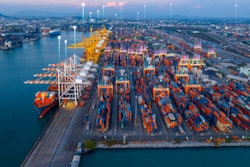As we’ve covered on the 10-44 in the past, cargo theft activity has skyrocketed across the country over the last couple of years. The July 4 holiday is just a week away, and cargo thieves are always more active during holidays when trucks sit longer than usual.
We know cargo theft activity has been surging for a couple of years now, but what has the first half of 2025 looked like?
Contents of this video:
00:00 10-44 intro
00:22 Cargo theft trends of 2025
01:44 Strategic cargo theft
02:34 Strategic cargo theft and phishing emails
04:35 Developing a culture around supply chain security
06:04 Cargo theft and long holiday weekends
08:45 Types of freight being targeted
09:37 Best practices to prevent cargo theft
12:19 Increases in strategic theft
Matt Cole:
What are the cargo theft trends of 2025 so far, and what can fleets do ahead of July 4th to protect their freight over the long holiday weekend?
Jason Cannon:
You're watching CCJs 10-44, a weekly episode that brings you the latest trucking industry news and updates from the editors of CCJ. Don't forget to subscribe and hit the bell for notifications, so you'll never miss an installment of 10 44. Hey everybody, welcome back. I'm Jason Cannon, and my co-host is Matt Cole. As we've covered on the 10 44 in the past, cargo theft activity is skyrocketed across the country over the last couple of years. July four holiday is just a few weeks away, and cargo thieves are always more active during holidays when trucks sit longer than they usually do.
Matt Cole:
We know cargo theft activity has been surging for a couple of years now, but what does the first half of 2025 look like?
Scott Cornell:
Yeah, 2025 isn't showing us anything different than what we've seen over the last couple years, right, so cargo theft continues to be a at all time. High rates, uh, I, I've been doing this for 30 years roughly, and you know, according to the cargo net numbers, cargo theft remains at all time high rates. So we're not really seeing across the industry any indication that cargo theft is slowing down. One of the most common questions I get is, Hey, when is it gonna go back to normal? And my comment is, because of the fundamental changes that we've seen in cargo theft over the last three or four years, this is the new normal barring any significant changes that nobody's anticipating right now or nobody sees coming. This is the new normal we saw between 2022 and 2024, beginning of 2022 to the end of 2024, we saw cargo theft go up according to carbon net over 90%.
And from those same cargo net numbers we show, we saw the report that that indicated that strategic theft in particular had seen a 1475% increase in that same period of time. So strategic theft went from, you know, roughly depending on what year you were looking at, three to 5% of all cargo theft to roughly 33% of all cargo theft. And that went up, that that increase in strategic theft hit the industry so fast that I think it, it had the industry largely on its heels. I think the trend within that trend is that for the most part, for most of my career, there would be five to six cargo theft methods in play at any given time. But what the industry is faced with right now is between 15 and 20 different methods in play when you combine between strategic theft and straight theft. So it's a lot more for the industry to have to defend itself against.
Jason Cannon:
Scott says one of the ways that he's seen strategic cargo theft grow within just the last year or so is through phishing emails and other social engineering methods targeting trucking companies.
Scott Cornell:
A year ago I was asked, at a speaking event that I was doing, I was asked, Hey, how often are you seeing phishing emails, social engineering based emails, you know, people getting into trucking companies, email accounts and things like that? And again, year ago, my answer to that, my reply to that at that time was, we see it across the industry, but it's not that frequent as we sit here today. That's a daily occurrence for the industry. And that's something that the industry's really struggling with is these phishing emails and these social engineering emails are put together so well that it's hard to get somebody not to click on them. You know, some of them have come out and they look so authentic, and they will actually, the link will actually take you to a cloned load board or things like that where you think you're on a load board that you're familiar with and you're entering your credentials, and that gives somebody access to your emails and they create an email account or your company name.
So that's one of the trends within that strategic, that trend that we're seeing a big increase in across the industry. When we go to the TAPA conference, the Southwest Transportation Security Conference, that topic is widely, uh, talked about right now. Just last week was the Midwest Conference, and it was a big topic of conversation at that conference too. So that's one of the big trends within the trend, uh, of strategic theft. And then I think, you know, the continued double brokering scams, that's the most frequent method that the industry is seeing within that strategic theft. Keep in mind though, even though we've seen that big increase in strategic theft, straight theft is still 65 to 67% of all cargo theft. And pilferage in particular has seen big increases in its numbers and in particular parts of the country as well,
Matt Cole:
To counteract the explosion of cargo theft, Scott believes trucking needs to develop a culture around supply chain security like it has around safety.
Scott Cornell:
The industry as a whole needs to develop a culture around supply chain security. You know, decades ago, you're well aware of it, as with anybody in the transportation industry, decades ago, the industry developed a culture around safety and everybody was involved in that. And that's a, that's a great thing. It was needed, and it's been a positive. We are at that point where the industry needs to develop a culture around cargo theft prevention. And that, what I mean by that is it can't just be, well, you know, that's the trucking company's responsibility, or in this case, that's the freight broker's responsibility or that's the shipper's responsibility. It has to be all of those entities getting together and dovetailing their practices so that they're working with one another, another, so that there's not gaps in between each of those entities. And the thieves can't prey on those gaps.
There has to be that cohesiveness and that culture developed across the industry. I think we're starting to see the outset of that in May. You know, I serve as the chairman for tapa, which is the Transport Asset Protection Association. And in May we hosted the National Card of Summit. We had record breaking attendance and there was a very good mix of shippers, freight brokers, trucking companies all there. And everybody was openly talking about what they're dealing with. And that's, to me, that's the beginning of developing that culture, just the fact that everybody's willing to talk about it and then talk about the solutions together
Jason Cannon:
Without cargo theft has trended in recent years and continues to trend this year. It's important that trucking companies always be alert and do everything they can to protect their freight and their equipment. The importance just ramps up around the holidays like July the fourth.
Scott Cornell:
I think the, the first thing is just a general heightened awareness that cargo theses have always loved the long weekend holidays. We've always seen increases of cargo theft across the industry. Cargo net does a great job of putting those numbers out. You know, the increases that they saw over Memorial Day, labor Day, 4th of July, Thanksgiving weekend, you name it, carnet Will, will always put that out and they'll, and they'll put a warning out in advance. A lot of, a lot of different industry entities will put a warning out in advance of those weekends. Why do they like that? Well, it really just, part of it is a, they know there's gonna be more freight moving or certain freight in demand for those times a year. But also, or the bigger part of it is they have an additional day where they think there's gonna be less eyes on and, and unfortunately they're usually right, there are fewer eyes on, right?
People take those holidays off or you're, you're, you have a smaller or a lighter, thinner staff working for those long weekends. And so their mentality is, Hey, we have an extra day before any eyeballs are on us, or before we have to start answering questions as to why the delivery hasn't been made. It gives them an extra day to squirrel away with the cargo before anybody starts asking questions or starts to look for it. So how do you prepare for that? Be prepared to have excellent communication if you have key loads, if you have loads that are out there for these long weekends or for any of these key days that are coming up, build communication around them. Build really good communication around them. What's the status of those? If you have tracking it, employ, make sure you're employing the tracking, but not only deploying the tracking in the loads and, and using it within the freight, but making sure you're monitoring it, making sure you're using the capabilities of those tracking to stay up to date while the drivers are on their brakes or at stops, things like that.
Is the freight supposed to be moving? Are you communicating with the driver in particular for the high target loads? Do you have a good carrier partner or a good freight broker partner that you're working with and understands the sensitivity of the long holiday weekend, a high target freight, the route that you, that the driver may be having to take just based on where the freight needs to move? Right? And what's the theft evaluation along that route? You know, are you taking all that into account and are you building your communication around it? And are you ready to go if there's a problem on a weekend when you may be lighter staff? Do you still have the right people in place that are aware that hey, you could get a call at two o'clock in the morning and you're gonna either respond right away?
Matt Cole:
So what types of freight are thieves keying in on this year?
Scott Cornell:
Yeah, right now. So we, we have the norms, right? Food and beverage is almost always number one. If everything's normal in the cargo effect world, I know that's like saying general shrimp, if everything's normal in cargo theft, you know, food and beverage is number one. And then it's alcohol and energy drinks and frozen meats and seafoods within that category, and then household goods and then electronics. But what the industry has seen quite a bit lately, and there's several bolos coming out and a lot of talk about it at conferences and on podcasts and things like that, is loads of copper metal loads in general. But in particular, copper is being targeted very heavily right now. Over the past two months, the industry has seen dozens of cargo loads stolen or rerouted or hit by the double brokering scams. So that commodity in particular, and metals in general right now are being highly targeted.
Jason Cannon:
Scott went through some best practices earlier, particularly for the upcoming holiday weekend, but what are some things that carriers should be doing all the time?
Scott Cornell:
Maybe I'm a little old school, but I think sometimes the best practices that have been place for a while are too easily overlooked, right? So when we work with clients, uh, to, to teach them how to prevent cargo theft, we work on a layered process with them. And, and for us, it's a three layer process. That first layer is always a good process and procedures, and a big part of that, especially for fleets, is just training of your frontline staff, training of the drivers, raising awareness of the drivers. I have always said, I think if you went back and looked at any podcast or any media thing that I've done, I have always said, I feel like the drivers are the best first frontline of defense that the industry has. And so the more you educate the drivers on, Hey, you are going to be hauling electronics out of southern California across the Arizona border, here's what the industry has seen, right?
And, and you can pull that up through carnet and other resources to see that pilfer theft of electronics along the Arizona California border is through the roof. And a lot of times if you educate the drivers on that and you talk to them about that, they'll avoid those hotspots. If you tell 'em the hotspots, they'll avoid those hotspots. 'cause they don't wanna, they don't wanna put the freight in that kind of a situation. So I think talking to them about maybe there's an alternative route, you know, when you're, when you're parking the truck, are you trying to park it in a well-lit area, parking it in a secure lot, if you have the opportunity, do you have high security rear door locks on the trailer so that it's harder to get into so that you're not a soft target? How long is your stop gonna be there?
Are you communicating with your dispatcher when you're making those stops so that they can monitor the tracking closer? Do you have covert tracking in there? And then you get to that second layer, which to us is that hard, hard security type stuff. The high security rear door locks, landing gear locks, air cuff locks, things like that. And then that third layer is the use of technology, whether that's a platform that helps you vet carriers and make sure you're hiring the right carrier, or if you're a carrier, that would be covert tracking some high security technology based locking devices that can now be purchased for trailer rear doors and things like that. So we always look at it as old school still works, meaning it's really based on those good process and procedures. Are you educating your staff? Are you helping to inform the drivers there in care, custody and control of your, of your freight so that they understand the risk, uh, that's around the freight and the route that they're gonna be driving. And then getting into the, enhancing that with the locks and the, and the security and the, and the technology.
Matt Cole:
While it's important to know where the cargo theft hotspots are around the country, with the proliferation of strategic theft, fleets should always be on alert.
Scott Cornell:
Strategic theft. The big increases that we talked about, uh, that were reported through cargo and on on on strategic theft have shown us that cargo theft is now beginning to spread into what we would consider non-traditional cargo theft areas of the country. Straight theft continues and straight theft, and within straight theft, which is pilferage. If you look at a heat map, it's the same heat map that we've always seen. Southern California, that Arizona border, Texas, Florida, Georgia, that New York, New Jersey area, Chicago, Memphis for straight theft. Most of that remains pretty much those same hotspots that we've always seen for all the same reasons we've always seen. Ports, rail yards, arterial highways, big economies, population density, all those same things, right? But with strategic theft and these big increases, we're seeing that they can basically be anywhere. And you know, we now know that a lot of these organized rings are based internationally, so they can be anywhere and they can target trade anywhere because they're going to try and send somebody to go pick it up for them. So don't think that if you are not in one of those traditional hotspots that you're probably not as vulnerable to cargo theft. I don't think that that's true anymore. I think cargo theft is and can be conducted through these strategic theft methods anywhere in the country, and we're seeing that pan out in those industry based heat maps and, and statistics.
Jason Cannon:
That's it for this week's 10-44. You can read more on ccjdigital.com. While you're there, sign up for our newsletter and stay up to date on the latest in trucking industry news and trends. If you have any questions or feedback, please let us know in the comments below. Don't forget to subscribe and hit the bell for notifications so you can catch us again next week.










